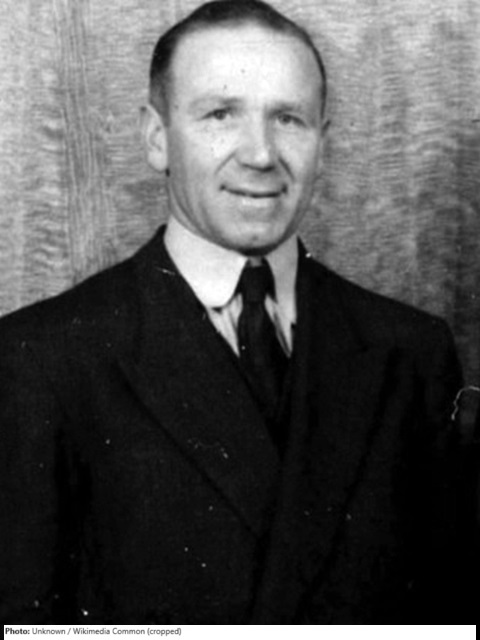
| Roles | Coach |
|---|---|
| Sex | Male |
| Full name | Alexander Matthew "Matt"•Busby |
| Used name | Matt•Busby |
| Born | 26 May 1909 in Orbiston, Scotland (GBR) |
| Died | 20 January 1994 (aged 84 years 7 months 25 days) in Cheadle, England (GBR) |
| Title(s) | Sir |
| NOC |  Great Britain Great Britain |
Two of the great England football managers were both Scots, and both managed Manchester United. Latterly there was Sir Alex Ferguson, but the man who laid the foundations for later United successes was the 1948 Great Britain Olympic football manager Sir Matt Busby.
The son of a Scottish miner, who was killed in the Great War a month before Busby’s eighth birthday, Matt was, by his own admission “Football mad”. He went on to play League football for Manchester United’s two biggest rivals, Manchester City and Liverpool, making 204 League appearances for City and 115 for Liverpool. His only honour, as a player, was an FA Cup-winners’ medal in 1934. Although he continued playing League and international football during World War II, he did not continue his playing career after the hostilities.
After the War, Busby was appointed manager of Manchester United in 1945, in succession to Scott Duncan, having turned down jobs coaching at Liverpool, the assistant manager’s job at Reading, and the manager’s role at Ayr United. In 1948 Busby guided United to their first FA Cup success since 1909 and, in 1952, their first League title since 1911.
Busby rebuilt the United team around the new breed of youngsters he brought to the club, and players like Eddie Colman, David Pegg, Billy Whelan, Bobby Charlton, and the mercurial Duncan Edwards, helped United win five consecutive FA Youth Cup finals between 1953-57. The youngsters, dubbed the “Busby Babes” helped United win back-to-back League titles in 1956 and 1957, but then disaster struck.
Following the introduction of the European Cup (now UEFA Champions’ League) Busby had a desire to win the biggest prize in European club football but, on 6 February 1958, his “Babes” were wiped out in a plane crash. Having beaten Red Star Belgrade to qualify for the semi-final of the that year’s European Cup, their plane stopped for refuelling at Munich on the way home from Belgrade but, in dreadful weather conditions, and after two aborted take-off attempts, their BEA Elizabethan took off at the third attempt but skidded off the runway, killing 23 of the 44 on board. Busby came close to death and was given the last rites. Of the 23 who perished, eight were United players, including Duncan Edwards, who survived 15 days before passing away. Busby was away from his desk for six months, and the rebuilding process started in his absence, with his assistant Jimmy Murphy in charge. Busby then set about building another team good enough to continue to challenge in Europe, and made some shrewd transfer deals, including bringing Alex Stepney, Pat Crerand and Denis Law to Old Trafford. He also spotted the extraordinary talents of a Northern Ireland youngster called George Best.
United won the FA Cup in 1963, and League title in 1965 and 1967, and then came Busby, and United’s, greatest moment. At Wembley Stadium in 1968, they overcame Benfica of Portugal 4-1 after extra time to win the European Cup, and become the first English side to do so. Glasgow Celtic had won it the year before, to become he first British winner of the trophy.
Busby stood down from the manager’s job in 1969 and made way for one of his old “Busby Babes”, Wilf McGuinness. The idea to promote from within did not work for United, and McGuinness was relieved of his duties in December 1970. Busby stepped back into the manager’s chair until 1971 when, after nearly 25 years at the club, he eventually retired. He had been awarded the CBE in 1958 and was knighted in 1968. He was made a Freeman of the City of Manchester, became a United director and then club president and, in 1982, became a vice-president of the Football League.
| Games | Sport (Discipline) / Event | NOC / Team | Pos | Medal | As | |
|---|---|---|---|---|---|---|
| 1948 Summer Olympics | Football (Football) |  GBR GBR |
Matt Busby | |||
| Football, Men (Olympic) | Great Britain | 4 |